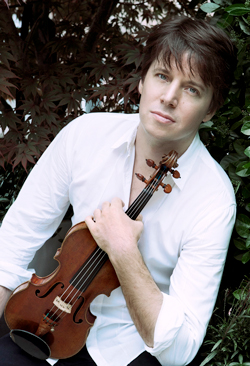by Daniel Hathaway

One of the most unpretentious and accessible artists on the professional concert circuit, Joshua Bell has been interviewed on many occasions. One of the most recent and engaging looks inside Bell’s life and career was provided by Cleveland pianist Zsolt Bognár in a 44-minute video interview with the violinist in his New York apartment. The sixteenth episode in Bognár’s series, “Living the Classical Life,” you can view that conversation here.
I recently had the opportunity to participate in an hour-long conference call with Joshua Bell and three other music writers who represented a magazine in California, an FM station in Dallas and a newspaper in Houston. Questions were posed round-robin style, and Bell responded in his signature, easy-going manner.
Three of the other writers were working on pieces previewing the recitals Bell will be giving on his current tour with pianist Alessio Bax. For my turn at bat, I zeroed in on the Bruch concerto Bell will be playing in Akron. Recalling that he made his Carnegie Hall debut in the Bruch with Leonard Slatkin and the St. Louis Symphony at the age of 17, I asked him what continued to appeal to him about that work after all these years.
“It’s a piece I’ve done so many times in my life, and it’s a piece I keep coming back to. I learned it when I was probably twelve years old,” he said. “One of its detriments in a way is that it’s often the first big concerto a young person learns. Sometimes we still have it in our heads that it’s a student-type concerto, along with the Mendelssohn. They suffer in a way from that reputation, or from our associations with music schools hacking away at them. Sometimes we forget how incredible they are. The Bruch is one of the greatest works written for the instrument, probably one of the greatest works by a great composer.
“Historically, Joseph Joachim — Brahms’s friend for whom he wrote his concerto — has been quoted as saying that there are four great violin concertos: the Brahms, the Beethoven, the Mendelssohn and the Bruch. And so the Bruch is really a pillar of the repertoire. There have been times when I’ve let it go for a few years because I’ve done it so much, then I’ve resurrected it and fallen in love with it in a fresh way. Now, I’ve been conducting it and playing it, which has added new life to it. I find it’s a very special piece with probably the most beautiful slow movement of any violin concerto. It’s got all the things an audience wants — it’s got beautiful tunes, it’s got excitement and energy. It’s got everything, which is why it’s so been successful for a hundred and fifty years.”
Bell said he has a new perspective on music now that he’s active as a conductor, having been appointed to succeed Sir Neville Marriner as artistic director of London’s Academy of St. Martin in the Fields. “When you conduct, you have to take more control and you have the opportunity to articulate many more things,” he said. “When I’m coming in as a soloist for one rehearsal with an orchestra, I have a limited amount of time and there’s a delicate balance between allowing the conductor to navigate the rehearsal and adding my own input. But when I’m doing it myself, I have much more luxury to go into. detail about how I imagine the piece, and also to articulate that. The process of conducting makes you think about the music in different ways. It deepens your feelings and it’s affected a lot the way I play. It’s been a benefit for me.”
Not all the questions posed to Joshua Bell were relevant to his Akron appearance, but toward the end of the session, queries became more general. One correspondent raised the question of classical music’s “aging audience.” “Is classical music still relevant?”
“People have been asking that for a long time,” Bell responded. “Every generation of classical musicians worries that it will be the last. I’m optimistic. There are lots of young people playing classical music and putting up videos. Its relevance is why it’s called ‘classical’ — it’s not about being trendy. It’s like Tolstoy, Dickens, Beethoven, Brahms. All of those are relevant.”
And is it OK to applaud between movements? “It depends. I usually don’t mind clapping at all. It’s historically correct and after the first movement of the Tchaikovsky concerto, it’s the most natural thing in the world to want to do. I’ve been told that when Beethoven’s seventh symphony was first played, the slow movement had to be repeated. Clapping in the ‘wrong’ place usually indicates a new listener, and that’s good. But I don’t like people clapping when I haven’t finished yet. Silence after a movement can be so meaningful. After an exciting ending, I’m all for it!”
And then there was the question about Bell’s status as an artist in his mid-40s. “You’re neither a prodigy or an elder statesman. Is this a sweet spot in your career?”
Bell bristled in amusement. “Sweet spot? That insinuates that things are going to go sour sometime soon! The thing about music is that it can only get better. Every year I learn something new. Last year, I had a week when I played concerts with two musicians who were over 90 — Menahem Pressler and Neville Marriner. I figure I have some good years left in me. But now I can choose what projects I want and what music I want to do. Meaningful things, not just to put food on the table.”
Published on ClevelandClassical.com November 4, 2014.
Click here for a printable copy of this article


